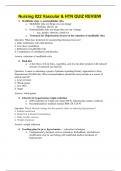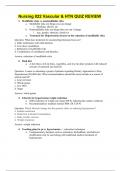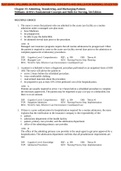Nursing 022 - Study guides, Class notes & Summaries
Looking for the best study guides, study notes and summaries about Nursing 022? On this page you'll find 49 study documents about Nursing 022.
All 49 results
Sort by
Nursing 022 Vascular & HTN QUIZ REVIEW
Nursing 022 Vascular & HTN QUIZ REVIEW
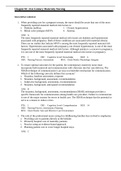
-
Williams: deWit's Fundamental Concepts and Skills for Nursing, 5th Edition
- Exam (elaborations) • 633 pages • 2022
-
- $15.50
- + learn more
1. When providing care for a pregnant woman, the nurse should be aware that one of the most frequently reported maternal medical risk factors is: a. Diabetes mellitus. c. Chronic hypertension. b. Mitral valve prolapse (MVP). d. Anemia. ANS: A The most frequently reported maternal medical risk factors are diabetes and hypertension associated with pregnancy. Both of these conditions are associated with maternal obesity. There are no studies that indicate MVP is among the most frequently rep...
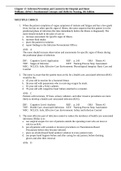
-
Chapter 17: Infection Prevention and Control in the Hospital and Home Williams: Dewitt's Fundamental Concepts and Skills for Nursing, 5th Edition
- Exam (elaborations) • 13 pages • 2022
-
- $10.49
- + learn more
Chapter 17: Infection Prevention and Control in the Hospital and Home Williams: Dewitt's Fundamental Concepts and Skills for Nursing, 5th Edition MULTIPLE CHOICE 1. When the patient complains of vague symptoms of malaise and fatigue and has a low-grade fever, but has no other specific signs of illness, the nurse suspects that this patient is in the prodromal phase of infection (the time immediately before the illness is diagnosed). The nurse should include in the plan of care to: a. incr...
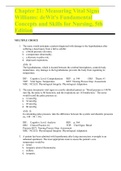
-
Chapter 21: Measuring Vital Signs Williams: deWit's Fundamental Concepts and Skills for Nursing, 5th Edition
- Exam (elaborations) • 12 pages • 2022
-
- $12.99
- + learn more
1. The nurse would anticipate a patient diagnosed with damage to the hypothalamus after suffering a head injury from a fall to exhibit: a. a blood pressure elevation. b. a temperature abnormality. c. a decrease in pulse rate. d. depressed respirations. ANS: B The hypothalamus, which is located between the cerebral hemispheres, controls body temperature. Any damage to the hypothalamus prevents the body from regulating its temperature. DIF: Cognitive Level: Comprehension REF: p. 344 OBJ:...
TEST BANK WILLIAMS: de Wits FUNDAMENTAL CONCEPTS AND SKILLS FOR NURSING, 5th EDITION
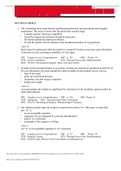
-
Chapter 37: Care of the Surgical Patient Williams: deWit's Fundamental Concepts and Skills for Nursing, 5th Edition
- Exam (elaborations) • 9 pages • 2022
-
- $14.49
- + learn more
1. The circulating nurse notes that the anesthetized patient has tensed muscles and irregular respirations. The nurse is aware that the patient has reached stage: a. I and the patient’s hearing is amplified. b. II and the surgical environment should be kept quiet. c. III and the patient has depressed reflexes. d. IV and the patient will not depend on the anesthesia machine of oxygenations. ANS: B Quiet must be maintained while the patient is in stage II, because noise may cause the pati...
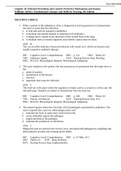
-
Chapter 16: Infection Prevention and Control: Protective Mechanisms and Asepsis Williams: deWit's Fundamental Concepts and Skills for Nursing, 5th Edition
- Exam (elaborations) • 14 pages • 2022
-
- $9.49
- + learn more
Chapter 16: Infection Prevention and Control: Protective Mechanisms and Asepsis Williams: deWit's Fundamental Concepts and Skills for Nursing, 5th Edition
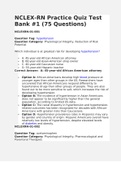
-
NCLEX-RN Practice Quiz Test Bank #1 (75 Questions)
- Exam (elaborations) • 62 pages • 2023
-
- $18.99
- + learn more
NCLEX-RN Practice Quiz Test Bank #1 (75 Questions) NCLEXRN-01-001 Question Tag: hypertension Question Category: Physiological Integrity, Reduction of Risk Potential Which individual is at greatest risk for developing hypertension? • A. 45-year-old African-American attorney • B. 60-year-old Asian-American shop owner • C. 40-year-old Caucasian nurse • D. 55-year-old Hispanic teacher Correct Answer: A: 45-year-old African American attorney • Option A: African-Americans develop ...
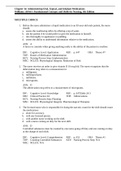
-
Chapter 34: Administering Oral, Topical, and Inhalant Medications Williams: deWit's Fundamental Concepts and Skills for Nursing, 5th Edition
- Exam (elaborations) • 10 pages • 2022
-
- $10.49
- + learn more
Before the nurse administers a liquid medication to an 83-year-old male patient, the nurse should: a. assess the swallowing reflex by offering a sip of water. b. ask the patient if he would prefer to give the medication to himself. c. mix thoroughly in applesauce or pudding. d. assess the ability to understand information relative to the medication. ANS: A A factor to consider when giving anything orally is the ability of the patient to swallow. DIF: Cognitive Level: Application REF: p. ...

Do you wonder why so many students wear nice clothes, have money to spare and enjoy tons of free time? Well, they sell on Stuvia! Imagine your study notes being downloaded a dozen times for $15 each. Every. Single. Day. Discover all about earning on Stuvia

